At Start Early, we know that reading is fundamental to a child’s development. As we celebrate Read Across America Day, we recognize the importance of making reading with your little ones a priority every day! By reading with your young child, you are not only bonding and inspiring a love of reading, but also developing strong early language and literacy skills that are key to future learning and success.
Stay Connected
Sign up to receive news, helpful tools and learn about how you can help our youngest learners.
No matter how old your child is — from babies and toddlers to preschoolers — these six tips from our experts will help you make the most of storytime:
- Start early. Reading to babies is important for healthy brain development and lays the foundation for language and writing skills.
- Make reading a part of your daily routine. Establishing a routine helps ensure that reading is part of your daily schedule, such as before naptime and bedtime. It also creates times during the day that both of you can look forward to.
- Try board and cloth books for babies. By age 1, most babies can grab books. Board and cloth books are great options for babies who like to touch things and put everything in their mouths.
- Take turns with your toddler. By age 2, most toddlers can hold a book and point at the pictures. Let your toddler turn the pages of a board book, and respond when they point or react to the story.
- Ask your child questions. As you read to your child, make the experience interactive by asking questions, such as “What do you think will happen next?” or “What was your favorite part of the story? Why?”
- Just keep reading. Reading to your child helps them develop a habit of listening to stories and loving books. This is one of the most important pieces of advice – make sure you are reading early and often.
One of the most important aspects of building early literacy skills is for parents to read to their young children. Through sharing these moments of being together and parents showing their genuine love for reading, children also get excited for reading which sets the foundation for building lifelong literacy skills.
Danielle Jordan, Senior Master Teacher, Educare Chicago
See our expert in action!
Check out how Educare Chicago Senior Master Teacher Danielle leads her class in a lesson on perspective and how you can tell the same story
in different ways.
Families living in communities that are under-resourced lack access to the quality early learning and care programs that help level the playing field and close the opportunity gap. With your support, we can provide literacy support for families in greatest need.
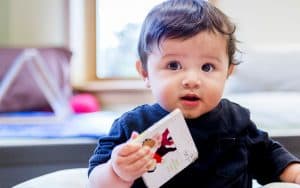 Whether your child is a newborn or about to head to kindergarten, here are some great books to read during storytime:
Whether your child is a newborn or about to head to kindergarten, here are some great books to read during storytime:
- Little Blue Truck by Alice Schertle
- Giraffes Can’t Dance by Giles Andreae
- Smile, Baby Faces Board Book by Roberta Grobel Intrater
- Hair Love by Matthew A. Cherry
- Peekaboo Morning by Rachel Isadora
- We’re Different, We’re the Same by Bobbi Kates
- Don’t Let the Pigeon Stay Up Late by Mo Willems
- Grumpy Monkey by Suzanne Lang and Max Lang
- What If by Samantha Berger
- Swimmy by Leo Lionni
- The Day the Crayons Quit by Drew Daywalt
Other Early Learning Resources:
Why Early Childhood
Quality early childhood is one of the best ways to level the playing field. Learn why and about the impact we’re having.
Support Our Work
Together, when we start early, we can close the opportunity gap and ensure every child has a chance to reach their full potential.
Resources for Families
Discover educational activities and resources from Start Early experts to provide easy and engaging educational experiences with your child.
For over 40 years Start Early has worked tirelessly to advance quality early learning and support for children and families. We know that starting early has the biggest impact on a child’s development and that Head Start and Early Head Start are an essential part of our work to help all children thrive.
In honor of Head Start Awareness Month, we spoke with Diana McClarien, our vice president of the Early/Head Start Network, to share how our relationship with Head Start began, the benefits of the program and our hopes for the future of Head Start and Early Head Start.
Invest in a Child’s Earliest Years
The first five years are a critical window to shape lifelong success. Act now to ensure children have the best start in life through quality early learning.
Start Early & Head Start
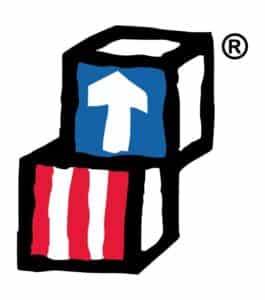 Start Early’s partnership with Head Start began in 1985, coinciding with the launch of the Beethoven Project, a groundbreaking program developed to provide wraparound services – including early education options – to families in Chicago’s Grand Boulevard neighborhood. Initially starting off as a grantee of Head Start funding, Start Early has since developed a deep, decades-long relationship with Head Start, that has culminated in a Start Early, Early/Head Start Network, two directly operated programs, and the aligned goals of delivering equitable access to high-quality early learning and care for children and families in the areas in which we operate.
Start Early’s partnership with Head Start began in 1985, coinciding with the launch of the Beethoven Project, a groundbreaking program developed to provide wraparound services – including early education options – to families in Chicago’s Grand Boulevard neighborhood. Initially starting off as a grantee of Head Start funding, Start Early has since developed a deep, decades-long relationship with Head Start, that has culminated in a Start Early, Early/Head Start Network, two directly operated programs, and the aligned goals of delivering equitable access to high-quality early learning and care for children and families in the areas in which we operate.
As our network now stands, we partner closely with several local community-based agencies, including our two directly operated programs – Educare Chicago and Healthy Parents & Babies – delivering not only early learning services but also crucial components like doula, home visiting, nutrition, family, health and wellness services. With Black and Hispanic children representing a disproportionate share of children living in disinvested areas, Head Start programs also play a crucial role in addressing opportunity gaps in school readiness for children facing systemic barriers.
Looking to the future, we will continue working in tandem with Head Start to best meet the needs of the families we serve and continue centering family and early childhood education provider voices and expertise in all areas of our work. We are also working to expand our network reach by partnering with new agencies to deliver Head Start services throughout Chicago and our surrounding suburbs and are actively expanding our efforts to address the teaching shortage in the early education field. Through this approach, we hope we can continue providing the best-in-class early education and services so that our children and families within our communities and programs can thrive.
In the 2023-2024 school year, Start Early served over 3,300 children through our Head Start and home visiting programs.
Head Start 101
Learn more about Head Start’s crucial role in promoting early childhood education, school readiness and comprehensive support for children and families across the country.
What is Head Start?
Head Start (HS) is a nation-wide, federally funded compensatory preschool education program. Head Start and Early Head Start (a division of Head Start specifically focused on children aged zero to three) are designed to promote school readiness in infants, toddlers and preschoolers. Head Start also serves pregnant women with a range of prenatal supports and postpartum educational opportunities.
Since 1965, Head Start has long been considered a premier model for early childhood programs (Ramey & Ramey, 2010), and has aimed to foster development and school readiness skills for children from primarily low-income communities.
With Black and Hispanic children representing a disproportionate share of children in poverty, Head Start programs act as a lever to address longstanding racial and ethnic gaps in school readiness outcomes.
Children that participate in Head Start programs make tremendous progress in the areas of language, literacy, and math, and achieve average scores related to letter-word knowledge by the end of their first year (Aikens et al., 2013; Bloom and Weiland, 2015).
The benefits are even more robust for children enrolled in Early Head Start, with higher kindergarten readiness scores and increased social-emotional, language, and cognitive development than children who never attend a Head Start program. (Love et al., 2002)
Head Start as a Model
Head Start programs are typically located in high-poverty areas and provide comprehensive services that address the needs of the whole child, including their physical, social, emotional, and cognitive development.
Many Head Start and Early Head Start programs are located within nonprofit organizations. These nonprofit organizations are uniquely positioned to help identify child care needs and develop workable solutions for families. They can also connect families with additional services through their network of local partners, who are able to leverage alternative sources of funding.
Invest in a Child’s Earliest Years
The first five years are a critical window to shape lifelong success. Act now to ensure children have the best start in life through quality early learning.
Celebrating Head Start Awareness Month
As part of Head Start Awareness Month, our Early/Head Start Network will launch a Child Development Associate® (CDA) program for parents that have children in Start Early and partner sites. The CDA Credential™ is an important credential for early childhood professionals, as obtaining it allows them to take the next step in their career.
We hope to engage with Head Start parents everywhere to elevate their perspectives and gain insights on the best ways to support their children. We know that when teachers and parents are aligned in building a solid foundation, children can thrive.
Join us this October as we celebrate and promote Head Start on social media! Use the #HeadStartAwareness hashtag in your posts to highlight the program.
More Like This
Why Early Childhood
Quality early childhood is one of the best ways to level the playing field. Learn why and about the impact we’re having.
Support Our Work
Together, when we start early, we can close the opportunity gap and ensure every child has a chance to reach their full potential.
Our Impact
Learn more about how we are supporting children, families and early childhood professionals as we improve the state of early learning in America.
Citations
- Bloom, H. S. and Weiland, C., Quantifying Variation in Head Start Effects on Young Children’s Cognitive and Socio-Emotional Skills Using Data from the National Head Start Impact Study (March 31, 2015).
- Love, J. M., Kisker, E. E., Ross, C. M., Schochet, P. Z., Brooks-Gunn, J., Paulsell, D., Boller, K., Constantine, J., Vogel, C., Sidle Fuligni, A., Brady-Smith, C. (2002). Making a difference in the lives of infants and toddlers and their families: The impacts of early Head Start. Volumes I-III: Final technical report and appendixes and local contributions to understanding the programs and their impacts. Washington, DC: U.S. Department of Health and Human Services, Administration for Children and Families, Office of Planning, Research and Evaluation.

The Capitol building on a bright September Day (Photo Credit: Erica Hallock)
September Economic and Revenue Forecast
On September 27, the Washington State Economic and Revenue Forecast Council met to receive a Revenue Review from the State’s Economist Dave Reich.
Before we get to the September forecast, it is important to provide background. At the June Review meeting, forecasted revenues for all funds* were projected to be down from the February 2024 forecast by $477 million in the 2023-2025 biennium and by $189 million in the 2025-27 biennium. This equals a total of $666 million less in projected revenues for the 2023-27 biennia. (Funds included in this forecast are: 1) General Fund-State; 2) the Education Legacy Trust Account; 3) the WA Opportunity Pathways Account; and 4) the Workforce Education Investment Account).
The updated revenue forecast released on September 27th did not see much movement from the June forecast, with overall revenues projected to be another $49M lower in our current biennium of 2023-25 but increased by $79M for the upcoming biennium. This leaves overall growth of $30M in revenue for the 2023-27 biennia since the June forecast, but an overall reduction in revenue of $636M from when the budget was written earlier this year.
Some interesting trends and things to note:
• Sales Tax Revenue is Down. For only the third time in the last 15 years, sales tax revenue is down year over year. Major reasons for this include lower construction and auto related activity. For both the 2023-25 and 2025-27 biennia, sales tax projections are lower in the September forecast than the June forecast. For 2023-25, the September forecast is projecting collection of $63.166B which is $131M less than what was projected in June, and for 2025-27, the September forecast is projection collection of $67.931B which is $53M less than what was projected in June.
• Other Revenue Collections Are Up. In contrast to sales tax revenues coming in lower than projected, other collections are expected to come in higher than projected, including the Business and Occupations (B&O) tax and the Real Estate Excise Tax (REET). These other sources are helping to offset lower sales tax receipts.
• Overall Revenue Expected to Grow from 2023-25 to 2025-27. Despite this slowing, total revenues subject to the outlook are expected to grow from $66.5 billion in the 2023-25 biennium to $71.6 billion in the 2025-27 biennium.
In response to a press question, Forecast Council Member and House Appropriations Committee Chair Representative Timm Ormsby noted that he did not anticipate any major adjustments to the second supplemental budget the Legislature will take up when they return in January 2025. (The second supplemental budget will address changes needed in the current fiscal year/biennium that concludes June 30, 2025.) Representative Ormsby went on to say he expected budget writers will be focused on fulfilling commitments in the underlying budget and responding to caseload and enrollment changes. He emphasized budget writers will “only be able to spend what they have.”
November Revenue Forecast and Caseload Forecast. The next Revenue Forecast/Review is scheduled for November 20. On November 13, the Washington State Caseload Forecast Council will meet to receive projections for the demand for entitlement programs such as K-12 education, Medicaid, prisons and foster care.
These reports will inform Governor Inslee’s final budget that will be released in mid-December.
Start Early Decision Package Summaries
As a reminder, Start Early Washington produced a summary of the early learning related Decision Packages submitted by state agencies to the Office of Financial Management for consideration for inclusion in Governor Inslee’s final budget.
The Capital Budget requests were recently made public, and our summary document has been updated to include that information.
To access the summaries, please visit the Policy Resources section of our webpage. Full copies of the Decision Packages can be viewed at abr.ofm.wa.gov.
More Like This
Contact Us
Connect with our team to learn more about our work or discuss how we can support policy and advocacy work for your organization.
Washington State Hub
Learn more about our work in Washington state and access relevant resources and publications.
 The Capitol building looking for sunshine on a cloudy August day (Photo Credit: Erica Hallock)
The Capitol building looking for sunshine on a cloudy August day (Photo Credit: Erica Hallock)
Special Trivia from Interview with Jim Camden, Longtime Spokesman Review Olympia Bureau Chief and Political Writer
Following the end of the 2024 legislative session, I had the honor of sitting down with longtime Spokesman Review Olympia Bureau Chief Jim Camden at the Olympia staple, Wagner’s European Bakery and Café, to chat about his decades-long career in journalism. Little did I know what a treat I would be in for, and I am not talking about the bakery items at Wagner’s! This Political Science major was riveted! (And, yes, we were politely asked to leave Wagner’s after staying past their closing time).
Read below for highlights of the conversation… but first, business items!
Decision Package Summaries
In mid-September, state agencies submitted Decision Packages (DPs) and Agency Request Legislation (ARLs) to the Governor’s Office of Financial Management (OFM). These requests represent agencies’ desired budget investments and policy changes for the upcoming biennium.
In June, former OFM Director David Schumacher issued instructions to state agencies urging that, based on the current revenue outlook and the state’s existing commitments, budget requests focus on caseload increases for current programs and not propose expansion or creation of new programs or services.
All of the Decision Packages for the operating budget can be found at abr.ofm.wa.gov. It is not the most user-friendly site, so please feel free to reach out if you need assistance with navigation. Start Early Washington has done a full recap of the DP’s related to early learning which can be found on our Policy Resources page.
You might be asking why state agencies make requests not only for the upcoming biennium (2025-27) but also for the following one (2027-2029). This is because our state requires a four-year balanced budget, so it is common to hear questions about the costs of proposals in the “four-year,” particularly if costs are projected to rise in future years.
To see a summary of the key early learning related decision packages, visit the Start Early Washington Policy Resources Page.
Next Steps
Over the next couple of months, OFM staff will review these Decision Packages and Agency Request Legislation submissions. Following the November 20th Revenue Forecast, OFM will work with Governor Inslee and his team to put the finishing touches on his final budget that will be released mid-December. At that point, we will know which of these Decision Packages are included in Governor Inslee’s budget.
Once the new governor is inaugurated, that individual can make changes to Governor Inslee’s proposed budget prior to legislative review.
A Quick Check-in on the State’s Revenue Picture
On September 13, the state’s Economic and Revenue Forecast Council met to receive an update from the state’s economist on the state’s economic outlook and revenue collection to date. The high-level take-away is that our state’s revenue collections are up $26M since the June 2024 forecast – .04%, or essentially flat.
The next Revenue Forecast will be on Friday, September 27, with the final forecast of the calendar year scheduled for November 20. This November forecast will be key as we should know the outcome of the initiatives on the November ballot and the November forecast will inform Governor Inslee’s final budget which will be released mid-December.
Capital Gains, Early Learning and the Education Legacy Account (ELTA)
Start Early Washington recently released a brief providing background information related to the Education Legacy Trust Account (ELTA) and how the capital gains tax and other revenues deposited into ELTA are used to support early learning and other educational priorities in Washington state.
Established in 2005, the ELTA was originally funded with portions of estate tax and cigarette taxes and was created to support common schools and to expand access to higher education. Over the years, the Legislature has adapted ELTA’s revenue sources and its uses, adding the capital gains tax as a revenue source and early learning as a use in 2021. Currently, ELTA funding is the second largest source of state funding for early learning in Washington. To learn more, you’ll find this document at the top of the Start Early Washington State Resources Page.
Interview with Longtime Spokesman Review Olympia Bureau Chief Jim Camden
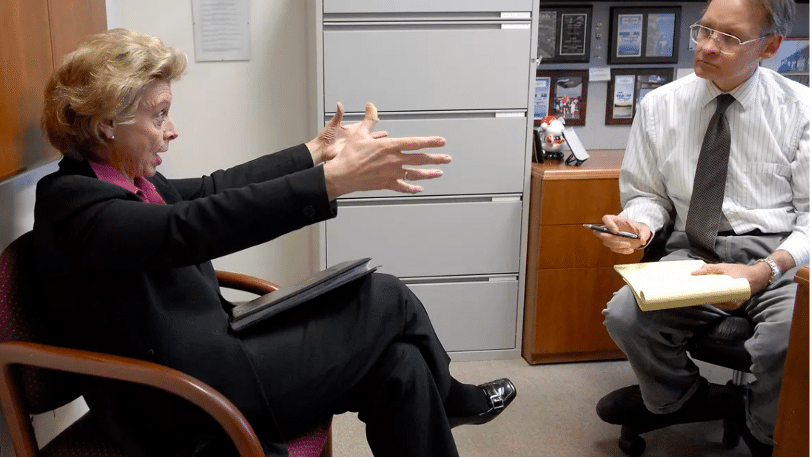 Jim Camden interviews former Governor Christine Gregoire (Photo Courtesy: Spokesman Review)
Jim Camden interviews former Governor Christine Gregoire (Photo Courtesy: Spokesman Review)
Enjoy highlights of my conversation with the Spokesman Review’s longtime Olympia Bureau Chief, Jim Camden…
Why Journalism and Why Spokane?
While attending the “Mizzou” School of Journalism (University of Missouri), Jim dreamed of becoming the next Ernest Hemingway, but realized the odds of hitting it big as a novelist were less than becoming a starving writer, so he opted for journalism.
Jim’s first professional journalist stop was in Lincoln, Nebraska where he worked for five years. There, Jim served as a night copy editor, night police reporter and eventually covered the Nebraska Legislature – which is unique in that it is the only unicameral Legislature in the country (meaning it has only one legislative body).
Early in his career, Jim applied for an open position with the Spokesman Review in its Olympia Bureau. Jim was asked what he knew about Washington state politics and when he responded with information about our state’s then U.S. Senators, he was told it was not possible to report on a state house without knowing the players and its landscape. Fair enough.
Thankfully, the Spokesman Review saw promise in Jim and ultimately hired him in 1981, offering him a nighttime general assignment position. As Jim talked about his professional trajectory, he described jobs and roles (like night policy reporter) that do not exist anymore as print journalism has both struggled financially and has become more automated.
Memories from Covering Spokane
Story #1 – The “South Hill Rapist”
When Jim and his wife moved to Spokane in 1981 to take on his new role with the paper, a serial rapist had the Spokane community terrified. A detail Jim omitted when hyping up the new community to his wife!
The perpetrator, Kevin Coe, was arrested and it turned out that Coe’s father, Gordon, was the managing editor of the Spokesman Review’s main competitor, the Spokane Chronicle (but both papers shared the same owner). Kevin Coe’s crimes centered on the city’s South Hill, hence the moniker the “South Hill Rapist.”
The story got more complicated when Gordon’s wife Ruth (Kevin’s mother) was arrested for trying to hire a hit man to kill the prosecutor as well as the judge in Kevin’s case. Jim said to me – something to the effect of – “there are no hit men in Spokane. If you think you are hiring a hit man, you are talking to a cop!”
One of Jim’s assignments included interviewing Gordon Coe after his wife’s arrest. Jim also attended the trials and sentencing for Kevin. Kevin served his full 25-year sentence at the Walla Walla State Penitentiary, and, in 2008, a jury found him to be a violent sexual predator, committing him to McNeil Island indefinitely.
If you are looking for an account of these events, I recommend Jack Olsen’s “Son: A Psychopath and His Victims.” An excellent book. Every time I drive by the location of Ruth Coe’s arrest (now a Ross Dress for Less store), I think about this bizarre story.
Story #2 – Candidate Filing Week Pre-Internet
On a much lighter note, Jim shared memories of candidate filing week from 1984. Of course, back in those days, there was no electronic filing – not even by fax machine! The first person in line got the first spot on the ballot, so candidates would camp out to secure the top spot on the ballot. Jim was there early, too, to capture the story.
I wonder what it looked like to see all of the elected and prospective elected officials waiting in line early in the morning. It must have been a sight!
Story #3 – President George H.W. Bush in Spokane, a Sapling and a Personal Check!
In 1989, Spokane’s Congressman, the Honorable Tom Foley, was Speaker of the House of Representatives and George H.W. Bush was serving as the President of the United States of America. As part of the 25th anniversary of the 1974 World’s Fair which was held in Spokane, President Bush visited Spokane in 1989. In honor of the World’s Fair environmental theme, President George H.W. Bush and Speaker Foley made joint remarks at the City’s Riverfront Park and together planted a sapling that came from an American elm planted by President John Quincy Adams at the White House. (Note: the poor sapling did not last long as its branches were destroyed and then; to preserve the tree, it was moved to an arboretum where it died after being planted too shallowly).
Anyway, like any good journalist, Jim was not satisfied with simply covering the public event at Riverfront Park. He knew President Bush was staying at the then-Sheraton Hotel next to the Park and he suspected the President would have dinner plans, probably with Speaker Foley since they enjoyed a cordial relationship. Jim kept a watchful eye on the presidential limousines from his own vehicle and when the limousines headed out, he did as well, keeping a safe distance so as not to not garner attention.
Sure enough, President Bush, his Environmental Protection Agency Secretary, Speaker Foley, and his wife Heather Foley were dining at the Patsy Clark Mansion which used to be a restaurant and now is a law office doubling as a wedding venue. Jim knew the owner of the restaurant asked and asked what the group ordered to eat (of course the party had the restaurant to themselves). Jim ended up talking to a server named Rose, who was serving the table that night. Rose shared she did not know until she showed up for work that day that she would be serving the President of the United States and that she was “wanded” by the Secret Service every time she walked back into the dining room. She also reported the President, upon the Speaker’s recommendation, ordered a Washington state Chardonnay paired with a steak.
This part of the story makes me smile. Jim learned that President Bush wrote a personal check for his meal. Tony Anderson, the owner of Patsy Clark, shared that he of course would never cash the check, a detail Jim included in his article about the dinner. Upon reading this from his room at the Sheraton the next morning, President Bush wrote personal notes to both Tony and Rose and sent cash thanking them for the memorable evening.
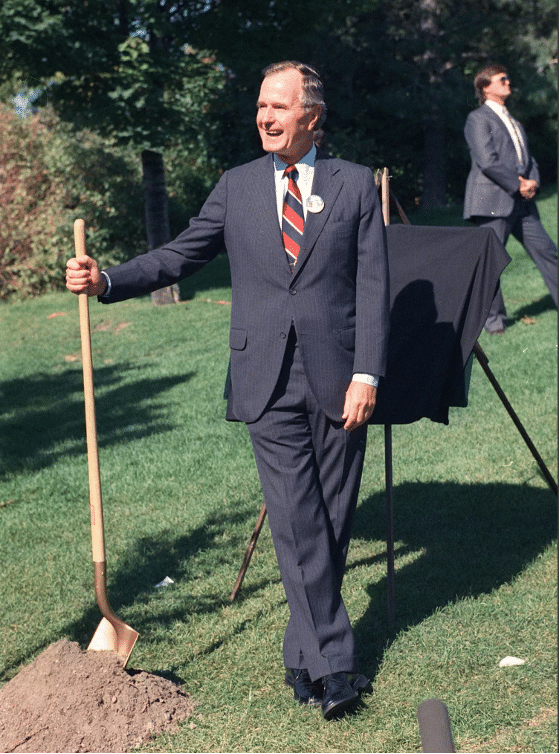 President George H.W. Bush prepares to plant a sapling from the White House at Spokane’s Riverfront Park in 1989 (Photo Courtesy: Spokesman Review)
President George H.W. Bush prepares to plant a sapling from the White House at Spokane’s Riverfront Park in 1989 (Photo Courtesy: Spokesman Review)
Covering Olympia
While his initial attempt to become the Olympia Bureau Chief for the Spokesman didn’t work out, Jim achieved that dream in 2009. During our time together, Jim shared memories of his time covering state politics in Olympia and his thoughts for the future of his profession.
One change he noted over his time in Olympia was the sharp decrease in the number of journalists covering the Olympia beat. Back in the day when there were two houses for journalists (the “Blue House” and the “White House” which were recently demolished as part of the Capitol campus restructure), journalists were assigned to a house to separate competitors. For example, reporters from competing Seattle papers would be assigned to different houses.
Jim noted that during gubernatorial press conferences under previous administrations, it would be standing room only, with journalists yelling out to get their questions answered. Today, there are empty chairs around the table and the environment is much more polite… a little too polite in Jim’s view. (Side note: as I was wrapping up this piece, a Brian Dudley piece in the Seattle Times noted reporters assigned to cover Olympia news had declined 70% since 2005).
I asked Jim to share about the various Governors he covered over his tenure and he – of course – had stories…
He found the first Governor he observed in this role, Booth Gardner, to be the most open and easiest to cover. During the 1984 general election, incumbent Governor John Spellman portrayed Gardner as a “tool of the labor unions.” Jim shared this tact was a surprise given Gardner’s status as heir to the Weyerhaeuser timber fortune and the expectation that Gardner would be pegged as an out-of-touch rich kid. According to Jim, a frequent sighting at that year’s Spokane Labor Rally were big buttons that read “Hi! I’m a big labor boss!” (mocking Spellman’s attempted jab).
Once elected, Gardner visited Spokane a lot because he liked to get out of the Capitol. Jim talked about joining the Governor and a Democratic state legislative candidate door belling one day when they happened upon the home of a Spokesman Review colleague, who was surprised to find both Governor Gardner and his colleague Jim randomly at his door.
Jim shared he admired that former Governor Gary Locke made the wise decision to marry a journalist (Mona Lee Locke) and moved his family out of the Governor’s Residence when it was overrun by bats!
Finally, Jim shared a story about former Governor Christine Gregoire and how she calmed down an entire room of children at a dinosaur exhibit who panicked after a series of unplanned and unexpected balloon explosions rattled their nerves. Governor Gregoire told the press something to the effect of “never underestimate a mom.”
I could go on and on with the remarkable stories and insights shared by Jim, but I do want to leave you with his answer to my question about the most impactful floor debate he witnessed, because he had obviously witnessed thousands of floor debates and votes from the mundane to the monumental. In terms of the most impactful floor debate during his tenure, Jim cited the House of Representatives’ February 8, 2012, two-hour debate on SB 6329 which brought marriage equality to Washington state. Jim found the debate “hearty” and thoughtful.
On January 4, 2021, Jim left the Spokesman Review as a full-time employee, but still writes for them on a part-time basis. He currently writes a Sunday column where he is known for frequently including quizzes on political/historical matters that can stump the best of us. He is also brought in to cover significant political stories where his expertise is key.
On September 9th, Jim was featured on the Spokesman’s front page in two places – his moderation of a discussion with the author of a new book about former Speaker of the House Tom Foley as well as his of coverage of I-2109, the effort to repeal the Capital Gains Tax. Feels pretty full-time to me!
A huge thanks to Jim and to all of the amazing journalists who cover our state houses!
More Like This
Contact Us
Connect with our team to learn more about our work or discuss how we can support policy and advocacy work for your organization.
Washington State Hub
Learn more about our work in Washington state and access relevant resources and publications.
To understand the Latino community is to understand that it is vastly diverse within itself. Each individual Latino culture is established within the country people are from, and cultures are kept and celebrated within each respective community while residing in the U.S.
Although many members of the Latino community speak Spanish, words mean different things based on their cultural origin and the individual education of each person. Acknowledging this diversity within the Latino community helps families feel welcomed and demonstrates inclusivity of all Latino cultures.
Stay Connected
Sign up to receive news, helpful tools and learn about how you can help our youngest learners.
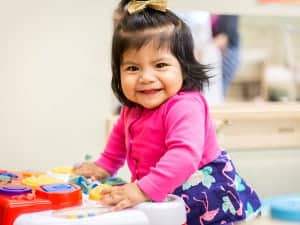 For young children, it’s important to show and appreciate the differences within each Latino community. Highlighting cultures by showcasing native attire, delicacies, country flags, differences in written language and general images of each culture help to create a shared understanding of what being a Latino means. This also helps Latino children create an identity and a sense of pride to be a Latino.
For young children, it’s important to show and appreciate the differences within each Latino community. Highlighting cultures by showcasing native attire, delicacies, country flags, differences in written language and general images of each culture help to create a shared understanding of what being a Latino means. This also helps Latino children create an identity and a sense of pride to be a Latino.
Hispanic Heritage Month is an opportunity for Latino children to understand the history of their family and their community. When speaking with a family in the native tongue, it creates a bond within the family unit that will help the child as they get older and learn to speak additional languages.
“Attire From Around the World” is an activity we like to do with the children and families we work with. Each child dresses up in an outfit that represents their nationality. Some students have worn Charo attire and folkloric dresses. Others braid their hair in a distinctive style or bring flags from their country to proudly display. We all love it when parents bring in food unique to their home country because it is a chance for all of us to sample special dishes and celebrate that culture! Children also love to take part in making pinatas – which are all created differently depending on what country they’re from.
Children’s Books to Read During Hispanic Heritage Month
Whether your child is a toddler, in pre-K or headed to kindergarten, here are books to read aloud with your little one to celebrate and learn about the Latino culture.
- My Colors, My World / Mis Colores, Mi Mundo by Maya Christina Gonzalez
- Dia En Que Descrubes Quien / The Day You Begin By Jacqueline Woodson
- The Day of the Dead / El Día de los Muertos: A Bilingual Celebration by Bob Barner
- Waiting for the Biblioburro / Esperando El Biblioburro by Monica Brown
- ¿De dónde eres? / Where Are You From? by Yamile Saied Méndez
- What Do You Celebrate?: Holidays and Festivals Around the World by Whitney Stewart
- Chicano Jr’s Mexican Adventure By Raúl Jiménez
- The Mexiglish Girl / La Chica Mexiglish by Natalia Simons
-
Abuelita and me/Abuelita y yo by Leonarda Carranza
-
Dreamers/Soñadores by Yuyi Morales
-
Paletero man/Hombre Paletero by Lucky Diaz
-
Isla to Island by Alexis Castellanos
-
Marcus Vega Doesn’t Speak Spanish by Pablo Cartaya
-
Loteria by Karla Arenas
-
Latinitas; Celebrating 40 Big Dreamers by Juliet Menendez
-
Be Bold! Be Brave! 11 Latinas Who Made U.S. History by Naibe Reynoso
-
Fearless Trailblazers: 11 Latinos Who Made U.S. History by Naibe Reynoso
-
Turning Pages: My Life Story by Sonia Sotomayor
-
Digging for Words: Jose Alberto Gutierrez and the Library He Built by Angela Burke Kinkel
-
Imagine by Juan Felipe Herrera
-
My Dog Just Speaks Spanish – by Andrea Caceres
More Like This
Take Action
Raise your voice and encourage lawmakers to prioritize early learning and care at the local, state and federal level.
Support Our Work
Together, when we start early, we can close the opportunity gap and ensure every child has a chance to reach their full potential.
Resources for Families
Discover educational activities and resources from Start Early experts to provide easy and engaging educational experiences with your child.
While the idea of “history” may be outside the understanding of a very young child, we can still celebrate Women’s History Month with them by reading books together that celebrate the potential and achievements of girls and women.
Stay Connected
Sign up to receive news, helpful tools and learn about how you can help our youngest learners.
Young children are constantly learning about the world and what is possible for them. Themed history months offer a wonderful opportunity to take stock of your home or classroom library and ask yourself: am I presenting a rich view of the world? Am I offering children ideas and possibilities? Am I fostering a strong sense of self, and an openness towards difference? Books are windows and mirrors, they can reflect children’s own lives, and they can offer glimpses into the lives of others. Women’s History Month presents us with a wonderful opportunity to explore the infinite paths a child might choose to pursue, regardless of gender.
When you select a new book to read with your child, choose something you think you will also enjoy. Your enthusiasm will be catching! Look for books with features that appeal to young children’s imaginations—not too many words on each page, rhythmic or rhyming text and illustrations that invite wonder. The books below are chosen for their appealing texts, rich illustrations and simple—but not simplistic—concepts. While the titles are sorted by age, all the books for the youngest readers will work with preschool-aged children also, and some, (like I Am Enough,) are books you might want to read even without a small child at your side! A high-quality picture-book with beautiful illustrations works for every age, (including adults!) because images are texts that foster meaning-making.
Children’s Books to Read During Women’s History Month
Whether your child is a toddler, in pre-K or on their way to kindergarten, here are some great book recommendations from Anne-Marie Akin, our Educare Chicago librarian to read during this month and beyond:
Books recommended for infants:
- I Like Myself! by Karen Beaumont
- Maya Angelou (Little People, Big Dreams) by Lisbeth Kaiser
- Frida: A Bilingual Counting Book by Patty Rodriguez and Ariana Stein
Books recommended for toddlers:
- A is for Awesome! 23 Iconic Women Who Changed the World by Eva Chen
- I Am Enough by Grace Byers
- ABC What Can She Be? by Jessie Ford and Sugar Snap Studio
Books recommended for children in pre-K or kindergarten:
- Planting Stories: The Life of Librarian and Storyteller Pura Belpré by Anika Aldamuy Denise
- Like a Girl by Lori Degman
- Mae Among the Stars by Roda Ahmed
- Women Artists A to Z by Melanie LaBarge
More Like This
Take Action
Raise your voice and encourage lawmakers to prioritize early learning and care at the local, state and federal level.
Support Our Work
Together, when we start early, we can close the opportunity gap and ensure every child has a chance to reach their full potential.
Resources for Families
Discover educational activities and resources from Start Early experts to provide easy and engaging educational experiences with your child.
At Start Early, we are committed to cultivating an environment built on the values of diversity, inclusion and belonging. The opening remarks were provided by Chandra Ewell.
February is Black History Month, a time to celebrate the achievements, culture and legacy of Black Americans who have made contributions and played a critical role in shaping our country. We take the month of February to center Black voices and honor Black stories as we lift up the past, recognize the present and share hopes for the future.
Stay Connected
Sign up to receive news, helpful tools and learn about how you can help our youngest learners.
It’s never too early to start sharing positive reflections by sharing diverse stories with your children. It is important for children not only to see themselves, but others represented in the books we read to them. Reading books with your little one is a fun and easy way to help introduce them to new cultures, experiences and events in history.
Literature transforms the human experience and reflects it back to us, and in that reflection, we can see our own lives and experiences as part of the larger human experience. Reading, then, becomes a means of self-affirmation.
"Mirrors, Windows and Sliding Glass Doors" by Rudine Sims Bishop
Children's Books To Read During Black History Month
Whether your child is a toddler, in pre-K or on their way to kindergarten, here are some great book recommendations from Anne-Marie Akin, our Educare Chicago librarian to read during this month and beyond:
Books recommended for infants:
- Bright Brown Baby: A Treasury by Andrea Davis Pinkney
- Sweet, Sweet Baby! by Javaka Steptoe
- Shades of Black: A Celebration of Our Children by Sandra L. Pinkney
Books recommended for toddlers:
- Feast For 10 by Cathryn Falwell
- Parker Looks Up: An Extraordinary Moment by Parker Curry and Jessica Curry
- My Hair is Beautiful by Shauntay Grant
Books recommended for children in pre-K or kindergarten:
- We Are Here (An All Because You Matter Book) by Tami Charles
- My People, a poem by Langston Hughes
- The ABCs of Black History by Rio Cortez
- Baby Says by John Steptoe
More Like This
Take Action
Raise your voice and encourage lawmakers to prioritize early learning and care at the local, state and federal level.
Support Our Work
Together, when we start early, we can close the opportunity gap and ensure every child has a chance to reach their full potential.
Resources for Families
Discover educational activities and resources from Start Early experts to provide easy and engaging educational experiences with your child.
We are excited to share our annual Start Early 2023 Year in Review, which showcases and celebrates accomplishments and growth from the last fiscal year (July 1, 2022 – June 30, 2023).
In 2023, we continued to promote equitable access to early learning programs and services that positively impact children and families.
2023 Year in Review: Promoting Equitable Access to Opportunity
Start Early influences nearly every aspect of the early education system through our dedicated and holistic approach at local, state, and federal levels. Our emphasis on collaborating with parents and community leaders helps us provide young children with a strong, all-encompassing foundation to enable the most positive growth outcomes.
This work would not have been possible without the collaboration and efforts of our partners. With your help, Start Early will continue to work to create a sustainable early learning system that meets the needs of today’s youngest learners and the little ones of tomorrow.
Why Early Childhood?
Quality early childhood is one of the best ways to level the playing field. Learn why and about the impact we’re having.
Support Our Work
Together, when we start early, we can close the opportunity gap and ensure every child has a chance to reach their full potential.
Our Impact
Learn more about how we are supporting children, families and early childhood professionals as we improve the state of early learning in America.
Stay Connected
Sign up to receive news, helpful tools and learn about how you can help our youngest learners.
American Indians have been using legends (stories) as a way of teaching ever since time began. There are many lessons in storytelling. Most legends stress that one should not be greedy, boastful, or make fun of others. The legends also encourage older children to watch out for and help younger children. In this way legends taught the right way to do things. The tradition of storytelling tells us that we have a strong heritage for being good listeners and for talking to our children. Positive parenting is based on this concept. To have strong children we need to have good relationships. Good relationships depend on being able to talk AND listen.
Positive Indian Parenting Curriculum, Lesson II: Lessons of the Storyteller
Children’s Books to Celebrate & Honor Native American Heritage Month
Storytelling is integral in Indigenous cultures—they can be told from books or through utilizing oral storytelling as a way for entertainment, education/teaching, and the sharing of culture and traditions.
As parents, we know that learning is most impactful when it’s shared with our children. Native American Heritage Month encourages us to engage in activities that promote understanding, respect and appreciation for Indigenous cultures. Here are a few age-appropriate books and resource recommendations you can share with your little one to celebrate this special month:
Books recommended for infants and toddlers:
- Black and White: Visual Stimulation Images for Babies by Morgan Asoyuf, Tsimshian
- Learn & Play by Various Native and First Nation Artists
- Good Morning World by Paul Windsor, Haisla
- Goodnight World by Various Native Artists
- We All Count by Jason Adair, Ojibway
- My Heart Fills With Happiness by Monique Gray Smith, Cree & Lakota
- Sweetest Kulu by Celina Kalluk, Inuit
- First Laugh, Welcome Baby! by Rose Ann Tahe, Navajo & Dine nish’li & Nancy Bo Flood
Books recommended for children in pre-K or kindergarten:
- You Hold Me Up by Monique Gray Smith, Cree & Lakota
- Powwow Day by Traci Sorell, Cheokee Nation
- Thunder’s Hair by Jessie Taken Alive-Rencountre, Hunkpapa Lakota
- We Are Water Protectors by Carole Lindstrom, Anishinabe/Métis
- Fry Bread by Kevin Noble Maillard, Seminole Nation
- Sweetgrass by Theresa Meuse, Mi’kmaq First Nation
Additional resources:
- Oral Storytelling: Gene Tagaban — Gene is an oral storyteller from Tlingit and Haida from Southeast Alaska. Every tribe has their own storytellers.
- Celebrating Native Cultures Through Words: Storytelling and Oral Traditions
Advancing Racial Equity
For over 40 years, Start Early has been singularly focused on the healthy development of young children, from before birth until kindergarten, helping close the opportunity gap and ensure children are ready to learn.
We are uncompromising in our pursuit of excellence and remain steadfast in our commitment to dismantling the unjust practices and policies that are harmful to children and families of color. Our work would not be possible without recognizing that each child and family has been uniquely impacted and traumatized by racism and generations of long-tolerated inequities.
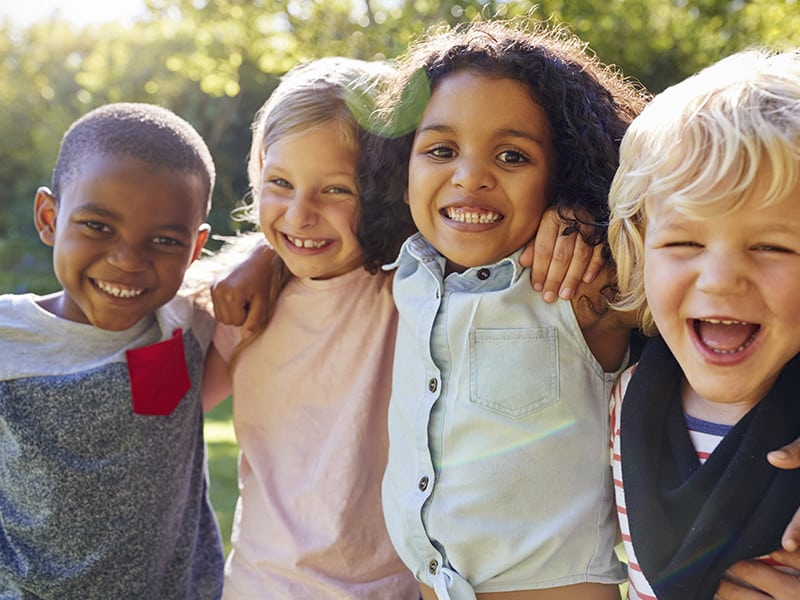
More Like This
Take Action
Raise your voice and encourage lawmakers to prioritize early learning and care at the local, state and federal level.
Support Our Work
Together, when we start early, we can close the opportunity gap and ensure every child has a chance to reach their full potential.
Resources for Families
Discover educational activities and resources from Start Early experts to provide easy and engaging educational experiences with your child.
In these tumultuous times, the need for greater diversity, equity and inclusion (DEI) is in the news almost every day. One of the best ways to raise tolerant, accepting and empathetic children ready to thrive in life is to start early, incorporating inclusion and anti-bias into early childhood education curriculum for infants, toddlers and their families.
Stay Connected
Sign up to receive news, helpful tools and learn about how you can help our youngest learners.
Danielle Jordan, a school director of Educare Chicago, recently shared the early childhood school’s DEI best practices, starting with the fundamentals.
Teachers at Educare Chicago incorporate songs, storytelling and books into the curriculum. Some of her favorites include:
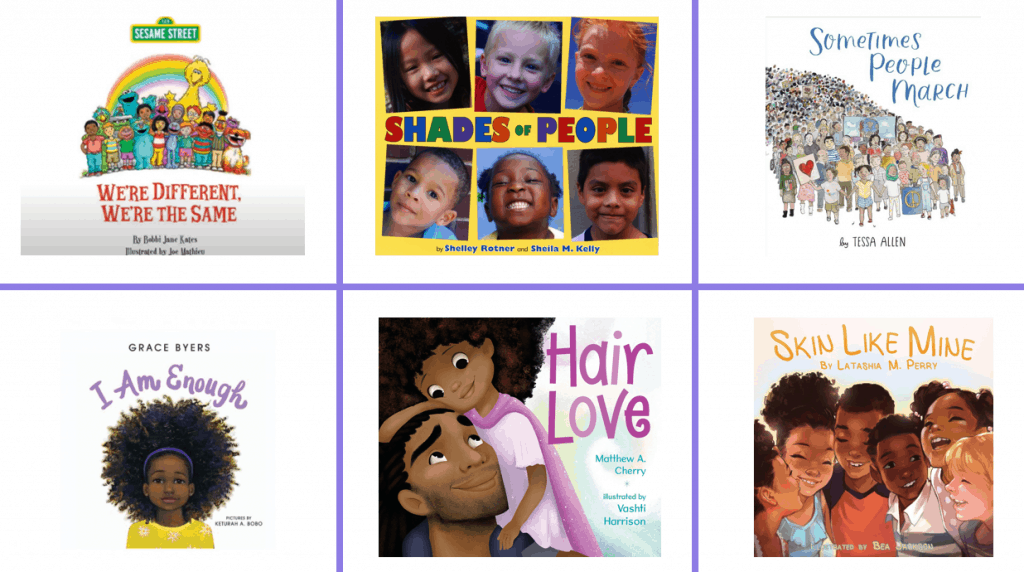
This approach to developing a child’s sense of confidence in their personal and social identities (e.g., gender, ethnic and religious) aligns with the National Association for the Education of Young Children’s (NAEYC) anti-bias education. As a result, children feel grounded in who they are without a need to be superior to anyone else. The approach also emphasizes a teacher’s capacity to help a child recognize how they are simultaneously different and similar to others, which helps children foster an ability to comfortably and empathetically engage with people from all backgrounds.
We encourage students to share what is distinct about their families, how they celebrate special occasions and what is important to them.
Danielle Jordan, School Director, Educare Chicago
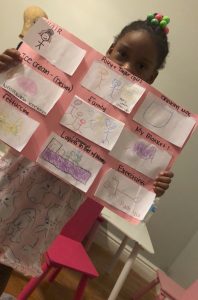 In a recent activity, children recently made posters showcasing their cultural heritage, as well as their similarities and differences. “The students were able to share and be proud of what makes them unique… your hair may be in ponytails, while my hair is in locks. The simple rule is we would like to treat people fairly and acknowledge that we are different but we’re also the same and need to show each other respect,” Jordan continues.
In a recent activity, children recently made posters showcasing their cultural heritage, as well as their similarities and differences. “The students were able to share and be proud of what makes them unique… your hair may be in ponytails, while my hair is in locks. The simple rule is we would like to treat people fairly and acknowledge that we are different but we’re also the same and need to show each other respect,” Jordan continues.
This focus on respect and appreciation for inclusion is particularly important during this time of racial unrest. “The way that we address the societal environment is by talking about community, family, culture and heritage,” says Jordan.
To help talk about these topics, staff at Educare Chicago have incorporated Sesame Street’s “We’re Different, We’re the Same” segment into their curriculum, as well as the book “Sometimes People March” by Tessa Allen.
We are doing exactly what our name says… We are starting early and building foundations that I hope will give the students what they need to go on.
Danielle Jordan, School Director, Educare Chicago
Educare Chicago teachers also help students learn how to process big emotions such as sadness and anger, while emphasizing that people express feelings in a variety of ways to encourage an appreciation for personality differences. The school’s Wellness Specialists also connect with parents to let them know where their children are from a socioemotional perspective and offer guidance for development.
Intensive family engagement is a core tenet of the school’s approach, meaning the school’s inclusive curriculum also extends to children’s first teachers: their parents and caregivers. Staff provide parents with book recommendations, including those outlined above to help encourage at-home discussions about DEI. There are also parent support groups and a Parent Committee to help parents to build strong relationships with staff and one another.
Jordan has already seen the impact of their work. Recently, students celebrated a very shy classmate for stepping outside his comfort zone to give a presentation to the entire school about his pet snake.
Learn more about how to address race and identity with children by reading our National Racial Day of Healing blog post.
What We Do
Our comprehensive approach applies our deep expertise in program, policy and research so that children, families and educators can thrive.
Support Our Work
Together, when we start early, we can close the opportunity gap and ensure every child has a chance to reach their full potential.
Our Impact
Learn more about how we are supporting children, families and early childhood professionals as we improve the state of early learning in America.
Stay Connected
Sign up to receive news, helpful tools and learn about how you can help our youngest learners.

